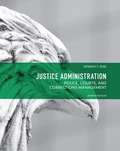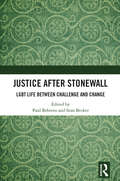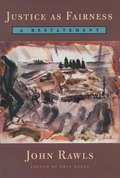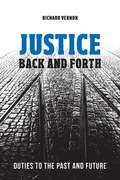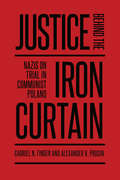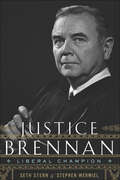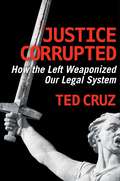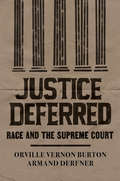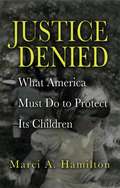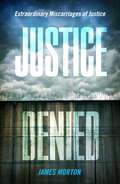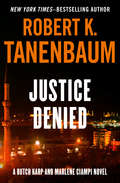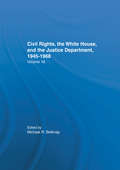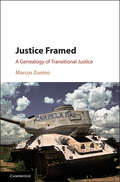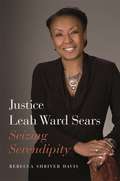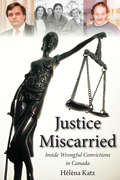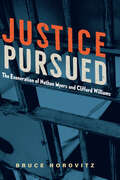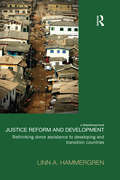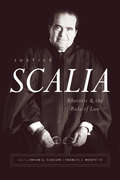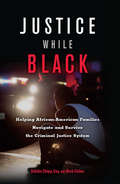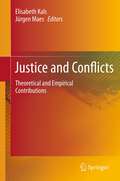- Table View
- List View
Justice Administration: Police Courts and Corrections Management (Seventh Edition)
by Kenneth J. PeakThis seventh edition of Justice Administration: Police, Courts, and Corrections Management continues its examination of all facets of the criminal justice system as well as several related matters of interest to prospective and current administrators. The general goal of the book is to inform the reader of the primary people, practices, and terms that are utilized in justice administration. The author has held several administrative and academic positions in a criminal justice career spanning more than 35 years; thus, this book’s 16 chapters contain a palpable real-world flavor not found in most textbooks.
Justice After Stonewall: LGBT Life Between Challenge and Change
by Paul Behrens Sean BeckerJustice After Stonewall is an interdisciplinary analysis of challenges and progress experienced by the LGBT community since the Stonewall riots in 1969. The riots (sparked by a police raid in New York City) are a milestone in LGBT history. Within a short time, a new feeling of confidence emerged, manifested in new LGBT organisations and the first Pride marches. Legal and social change followed: from the decriminalisation of homosexual activities to anti-discrimination laws and the legalisation of same-sex marriage. This makes it tempting to think of modern LGBT history as an unequivocal success story. But progress was not achieved everywhere: in 70 States, same-sex relations are still criminalised; violence against LGBT persons still occurs, and transgender people still struggle to have their rights recognised. The question whether the path since Stonewall represents success or failure cannot be answered by one discipline alone. This book breaks new ground by bringing together experts from politics, sociology, law, education, language, medicine and religion to discuss fields as diverse as same-sex marriage, transgender students, the LGBT movement in Uganda and LGBT migrants in the Arabian Peninsula, conversion 'therapy', and approaches to LGBT matters in Judaism, Christianity and Islam. What emerges is a rich tapestry of LGBT life today and its consideration from numerous perspectives. Based on thorough research, this book is an ideal text for students and scholars exploring LGBT matters. At the same time, its engaging style makes it a particularly valuable resource for anyone with an interest in LGBT matters and their reception in today's world.
Justice As Fairness: A Restatement
by John Rawls Erin KellyThis book originated as lectures for a course on political philosophy that Rawls taught regularly at Harvard in the 1980s. In time the lectures became a restatement of his theory of justice as fairness, revised in light of his more recent papers and his treatise Political Liberalism (1993). As Rawls writes in the preface, the restatement presents "in one place an account of justice as fairness as I now see it, drawing on all [my previous] works. " He offers a broad overview of his main lines of thought and also explores specific issues never before addressed in any of his writings. Rawls is well aware that since the publication of A Theory of Justice in 1971, American society has moved farther away from the idea of justice as fairness. Yet his ideas retain their power and relevance to debates in a pluralistic society about the meaning and theoretical viability of liberalism. This book demonstrates that moral clarity can be achieved even when a collective commitment to justice is uncertain.
Justice Back and Forth: Duties to the Past and Future
by Richard VernonIdeas of justice have traditionally focused on what individuals owe to one another and have drawn our attention to what is considered fair - what one of us owes to another is justly matched by what the other owes to them. However, what does justice require us to do for past and future generations?In Justice Back and Forth, award-winning author Richard Vernon explores the possibility of justice in cases where time makes reciprocity impossible. This "temporal justice" is examined in ten controversial cases including the duty to return historical artifacts, the ethics and politics of parenting, the punishment of historical offences, the right to procreate, and the imposition of constitutions on future citizens. By deftly weaving together discussions on historical redress and justice for future generations, Vernon reveals that these two opposing topics can in fact be used to illuminate each other. In doing so, he concludes that reciprocity can be adapted to serve intergenerational cases.
Justice Behind the Iron Curtain: Nazis on Trial in Communist Poland (German and European Studies)
by Alexander Prusin Gabriel FinderIn Justice Behind the Iron Curtain, Gabriel N. Finder and Alexander V. Prusin examine Poland’s role in prosecuting Nazi German criminals during the first decade and a half of the postwar era. Finder and Prusin contend that the Polish trials of Nazi war criminals were a pragmatic political response to postwar Polish society and Poles’ cravings for vengeance against German Nazis. Although characterized by numerous inconsistencies, Poland’s prosecutions of Nazis exhibited a fair degree of due process and resembled similar proceedings in Western democratic counties. The authors examine reactions to the trials among Poles and Jews. Although Polish-Jewish relations were uneasy in the wake of the extremely brutal German wartime occupation of Poland, postwar Polish prosecutions of German Nazis placed emphasis on the fate of Jews during the Holocaust. Justice Behind the Iron Curtain is the first work to approach communist Poland’s judicial postwar confrontation with the legacy of the Nazi occupation.
Justice Brennan: Liberal Champion
by Seth Stern Stephen WermielA sweeping insider look at the life of William Brennan, champion of free speech and widely considered the most influential Supreme Court justice of the twentieth centuryBefore his death, William Brennan granted Stephen Wermiel access to volumes of personal and court materials that are sealed to the public until 2017. These are what Jeffrey Toobin has called “a coveted set of documents” that includes Brennan’s case histories—in which he recorded strategies behind all the major battles of the past half century, including Roe v. Wade, affirmative action, the death penalty, obscenity law, and the constitutional right to privacy—as well as more personal documents that reveal some of Brennan's curious contradictions, like his refusal to hire female clerks even as he wrote groundbreaking women’s rights decisions; his complex stance as a justice and a Catholic; and details on Brennan’s unprecedented working relationship with Chief Justice Earl Warren. Wermiel distills decades of valuable information into a seamless, riveting portrait of the man behind the Court's most liberal era.
Justice Corrupted: How the Left Weaponized Our Legal System
by Ted Cruz. . . with liberty and justice for some. The left has corrupted the U.S. legal system. Wielding the law as a weapon, arrogant judges and lawless prosecutors are intimidating, silencing, and even imprisoning Americans who stand in the way of their radical agenda. Their "enemies list" even includes parents who dare to speak up for their children at school board meetings. <p><p>In this shocking new book, Senator Ted Cruz takes readers inside the justice system, showing how the wrong hands on the levers of power can strangle liberty, crush opposition, and wreck lives. The notion of a "Democratic" or "Republican" Department of Justice is outrageous. That institution should safeguard the Constitutional rights of all Americans. <p><p>Justice Corrupted will equip patriots and lovers of liberty to hold their government accountable. <p> <b>New York Times Bestseller</b>
Justice Deferred: Race and the Supreme Court
by Orville Vernon Burton Armand DerfnerIn the first comprehensive accounting of the U.S. Supreme Court’s race-related jurisprudence, a distinguished historian and renowned civil rights lawyer scrutinize a legacy too often blighted by racial injustice. The Supreme Court is usually seen as protector of our liberties: it ended segregation, was a guarantor of fair trials, and safeguarded free speech and the vote. But this narrative derives mostly from a short period, from the 1930s to the early 1970s. Before then, the Court spent a century largely ignoring or suppressing basic rights, while the fifty years since 1970 have witnessed a mostly accelerating retreat from racial justice. From the Cherokee Trail of Tears to Brown v. Board of Education to the dismantling of the Voting Rights Act, historian Orville Vernon Burton and civil rights lawyer Armand Derfner shine a powerful light on the Court’s race record—a legacy at times uplifting, but more often distressing and sometimes disgraceful. For nearly a century, the Court ensured that the nineteenth-century Reconstruction amendments would not truly free and enfranchise African Americans. And the twenty-first century has seen a steady erosion of commitments to enforcing hard-won rights. Justice Deferred is the first book that comprehensively charts the Court’s race jurisprudence. Addressing nearly two hundred cases involving America’s racial minorities, the authors probe the parties involved, the justices’ reasoning, and the impact of individual rulings. We learn of heroes such as Thurgood Marshall; villains, including Roger Taney; and enigmas like Oliver Wendell Holmes and Hugo Black. Much of the fragility of civil rights in America is due to the Supreme Court, but as this sweeping history also reminds us, the justices still have the power to make good on the country’s promise of equal rights for all.
Justice Denied
by Marci A. HamiltonThere is a silent epidemic of childhood sexual abuse in the United States and a legal system that is not effectively protecting children from predators. Recent coverage of widespread abuse in the public schools and in churches has brought the once-taboo subject of childhood sexual abuse to the forefront. The problem extends well beyond schools and churches, though: the vast majority of survivors are sexually abused by family or family acquaintances with 90 percent of abuse never reported to the authorities. Marci A. Hamilton proposes a comprehensive yet simple solution: eliminate the arbitrary statutes of limitations for childhood sexual abuse so that survivors past and present can get into court. In Justice Denied, Hamilton predicts a coming civil rights movement for children and explains why it is in the interest of all Americans to allow victims of childhood sexual abuse this chance to seek justice when they are ready.al abuse this chance to seek justice when they are ready.
Justice Denied: Extraordinary miscarriages of justice
by James MortonAn incisive examination by the bestselling author of The Mammoth Book of Gangs of some of the many miscarriages of justice of this and the previous century, which have seen innocent men and women found guilty, and sometimes executed. This shocking 'manual of injustice' exposes wrongful convictions and acquittals as a result of the chicanery of some forensic scientists, over-zealous or negligent police officers under pressure to get results, incompetent lawyers, lying witnesses, bribed juries, judicial blunders and feeble politicians. Sometimes, however, it is truculent and uncooperative defendants who prove their own worst enemies. It shows the mistakes that can be made in the face of a baying public and a rabid press, mistakes which have seen innocent men and women found guilty, and sometimes executed, while others have served lengthy sentences. It reveals critical flaws in criminal justice systems throughout the world (it is estimated, for example, that two per cent of felony cases in America result in wrongful convictions). Morton explores folk devils and moral panics, both historical such as the 'witches' of Salem and and much more recent cases like that of the West Memphis Three. It considers cases of race hatred, the impact of DNA, fit-ups, fake 'experts', doubtful science and the long road to the court of appeal. He also looks at what happens to the victims of miscarriages of justice, whether they go on to prosper or, as is sadly so often the case, never really recover. How did the boxer Rubin 'The Hurricane' Carter come to be wrongly convicted of a triple homicide? The alibi of Joe Hill, the Industrial Workers of the World activist wrongly executed for the murder of a Utah grocer and his son, came too late to save him from execution. On the other hand, Lindy Chamberlain (famously portrayed by Meryl Streep in A Cry in the Dark), has finally, over thirty years after the fact, had her claim that her baby Azaria was taken by a dingo at Ayers Rock in the Australian Outback upheld by a coroner. Among many other cases, Morton also considers the 1910 case of two men convicted of the murder of a man still alive in 1926, and case of the West Memphis Three, who were convicted as teenagers in 1994 of the murders of three boys in Arkansas and released in 2011 in a plea bargain after eighteen years, though the prosecution still refuses to accept their innocence.
Justice Denied: Reversible Error, Material Witness, And Justice Denied (Butch Karp and Marlene Ciampi #7)
by Robert K. TanenbaumManhattan&’s homicide bureau chief investigates a murder at the UN in the New York Times–bestselling author&’s &“most powerful thriller yet&” (Vincent Bugliosi). While on his way to the UN, a Turkish diplomat is gunned down in the street. All signs point to an ancient blood feud, and the NYPD quickly tracks down their lead suspect: an Armenian nationalist they believe was out to avenge the Armenian genocide. He fits their suspect profile perfectly—so perfectly, in fact, that Chief Butch Karp is beginning to doubt the story. With the help of his crime-fighting wife Marlene Ciampi, Karp digs into the diplomat&’s death, uncovering a deadly web of corruption far more sinister than even he could have imagined. Written by legendary prosecutor and New York Times–bestselling author Robert K. Tanenbaum, Justice Denied exposes the kind of dirty dealing that goes on in the shadow of the UN. Justice Denied is the 6th book in the Butch Karp and Marlene Ciampi series, but you may enjoy reading the series in any order. &“Tanenbaum&’s experience as a New York City assistant district attorney serves him well in this gritty tale of intrigue.&” —Chicago Tribune &“Scrupulously realistic.&” —Joseph Wambaugh, author of The Onion Field &“A highly satisfying tale.&” —Library Journal
Justice Department Civil Rights Policies Prior to 1960: Crucial Documents from the Files of Arthur Brann Caldwell
by Michal R. BelknapFirst published in 1991. This is Volume 16 of 18 in a series of works on Civil Rights, the White House and the Justice Department from 1945 to 1968. This volume looks at Civil Rights policies prior to 1960 in the Justice Department.
Justice Framed: A Genealogy of Transitional Justice
by Marcos ZuninoWhy are certain responses to past human rights violations considered instances of transitional justice while others are disregarded? This study interrogates the history of the discourse and practice of the field to answer that question. Zunino argues that a number of characteristics inherited as transitional justice emerged as a discourse in the 1980s and 1990s have shaped which practices of the present and the past are now regarded as valid responses to past human rights violations. He traces these influential characteristics from Argentina's transition to democracy in 1983, the end of communism in Eastern Europe, the development of international criminal justice, and the South African truth commission of 1995. Through an analysis of the post-World War II period, the decolonisation process and the Cold War, Zunino identifies a series of episodes and mechanisms omitted from the history of transitional justice because they did not conform to its accepted characteristics.
Justice Is Served: A Tale of Scallops, the Law, and Cooking for RBG
by Leslie Karst“The book is a romp from cover to cover—and, just like a great meal, left me ready for more.”—Karen Shimizu, Executive Editor, Food & Wine When Leslie Karst learned that her offer to cook dinner for Supreme Court Justice Ruth Bader Ginsburg and her renowned tax law professor husband, Marty, had been accepted, she was thrilled—and terrified. A small-town lawyer who hated her job and had taken up cooking as a way to add a bit of spice to the daily grind of pumping out billable hours, Karst had never before thrown such a high-stakes dinner party. Could she really pull this off? Justice Is Served is Karst’s light-hearted, earnest account of the journey this unexpected challenge launched her on—starting with a trip to Paris for culinary inspiration, and ending with the dinner itself. Along the way, she imparts details of Ginsburg’s transformation from a young Jewish girl from Flatbush, Brooklyn, to one of the most celebrated Supreme Court justices in our nation’s history, and shares recipes for the mouthwatering dishes she came up with as she prepared for the big night. But this memoir isn’t simply a tale of prepping for and cooking dinner for the famous RBG; it’s also about how this event, and all the planning and preparation that went into it, created a new sort of connection between Karst, her partner, and her parents, and also inspired Karst to make life changes that would reverberate far beyond one dinner party. A heartfelt story of simultaneously searching for delicious recipes and purpose in life, Justice Is Served is an inspiring reminder that it’s never too late to discover—and follow—your deepest passion.
Justice Leah Ward Sears: Seizing Serendipity
by Rebecca DavisThis is the first full biography of Justice Leah Ward Sears. In 1992 Sears became the first woman and youngest justice to sit on the Supreme Court of Georgia. In 2005 she became the first African American woman to serve as chief justice of any state supreme court in the country. This book explores her childhood in a career military family; her education; her early work as an attorney; her rise through Georgia's city, county, and state court systems; and her various pursuits after leaving the supreme court in 2009, when she transitioned into a life that was no less active or public. <p><p> As the biography recounts Sears's life and career, it is filled with instances of how Sears made her own luck by demonstrating a sharpness of mind and sagacious insight, a capacity for grueling hard work, and a relentless drive to succeed. Sears also maintained a strict devotion to judicial independence and the rule of law, which led to decisions that would surprise conservatives and liberals alike, earned the friendship of figures as diverse as Ambassador Andrew Young and Justice Clarence Thomas, and solidified a reputation that would land her on the short list of replacements for two retiring U.S. Supreme Court justices. <p> As a woman, an African American, a lawyer, and a judge, Sears has known successes as well as setbacks. Justice Leah Ward Sears shows that despite political targeting, the death of her beloved father, a painful divorce, and a brother's suicide, she has persevered and prevailed.
Justice Miscarried
by Helena KatzFormer bank manager Ronald Dalton never got to watch his three young children grow up. In 1989 he was convicted for a crime that never happened. His wife, Brenda, was later ruled to have choked to death on breakfast cereal not strangled as a pathologist had initially claimed. Dalton’s daughter, Alison, was in kindergarten when he was charged with second-degree murder in 1988. He attended her high school graduation on June 26, 2000, two days after his conviction was finally overturned. <p><p> Behind the proud facade of Canada’s criminal justice system lie the shattered lives of the people unjustly caught within its web. Justice Miscarried tells the heartwrenching stories of twelve innocent Canadians, including David Milgaard, Donald Marshall, Guy Paul Morin, Clayton Johnson, William Mullins-Johnson, and Thomas Sophonow, who were wrongly convicted and the errors in the nations justice system that changed their lives forever.
Justice Outsourced: The Therapeutic Jurisprudence Implications of Judicial Decision-Making by Nonjudicial Officers
by Kelly Frailing Michael L. PerlinNonjudicial officers (NJOs) permeate the criminal justice and the forensic mental health systems in hidden ways. But what are the impact and consequences of non-lawyers and non- “real judges” hearing cases? Across the nation, numerous cases are outsourced to administrative and other NJOs to decide issues ranging from family court cases involving custody disputes and foster care, to alcohol, substance abuse, as well as mental health and institutionalization issues. Moreover, NJOs may also deal with probation sentencing, conditions of confinement, release restrictions, and even capital punishment. The editors and contributors to the indispensable Justice Outsourced examine the hidden role of these non-judicial officers in the courtroom and administrative settings, as well as the ethical and practical considerations of using NJOs. Written from the perspective of therapeutic jurisprudence by judges, criminologists, lawyers, law professors, psychologists, and sociologists, this volume provides a much-needed wake-up call that emphasizes why the removal of a judge weakens a defendant’s rights and dignity and corrupts the administration of justice. However, Justice Outsourced also suggests effective employments of NJOs, revealing the potential of therapeutic principles and procedures to enhance the practical knowledge supplied by nonjudicial decision-makers.
Justice Outsourced: The Therapeutic Jurisprudence Implications of Judicial Decision-Making by Nonjudicial Officers
by Michael L. Perlin and Kelly FrailingNonjudicial officers (NJOs) permeate the criminal justice and the forensic mental health systems in hidden ways. But what are the impact and consequences of non-lawyers and non- “real judges” hearing cases? Across the nation, numerous cases are outsourced to administrative and other NJOs to decide issues ranging from family court cases involving custody disputes and foster care, to alcohol, substance abuse, as well as mental health and institutionalization issues. Moreover, NJOs may also deal with probation sentencing, conditions of confinement, release restrictions, and even capital punishment. The editors and contributors to the indispensable Justice Outsourced examine the hidden role of these non-judicial officers in the courtroom and administrative settings, as well as the ethical and practical considerations of using NJOs. Written from the perspective of therapeutic jurisprudence by judges, criminologists, lawyers, law professors, psychologists, and sociologists, this volume provides a much-needed wake-up call that emphasizes why the removal of a judge weakens a defendant’s rights and dignity and corrupts the administration of justice. However, Justice Outsourced also suggests effective employments of NJOs, revealing the potential of therapeutic principles and procedures to enhance the practical knowledge supplied by nonjudicial decision-makers.
Justice Pursued: The Exoneration of Nathan Myers and Clifford Williams
by Bruce HorovitzAn in-depth look at the reversal of a wrongful conviction in a noteworthy example of the justice system seeking to correct mistakes of the past In 2019, Nathan Myers and Clifford Williams were released after almost 43 years in prison when murder charges against them were dismissed in the first exoneration brought about through a Conviction Integrity Review unit in Florida. Justice Pursued is the story of this wrongful conviction and its landmark reversal, which made headlines as it was initiated by the same state office that sought the death penalty for both men in 1976.Journalist Bruce Horovitz describes in detail the events of the murder of Jeanette Williams and the one-sided trial, conviction, and life sentencing of Nathan Myers and Clifford Williams, drawing on first-person interviews as well as case documents, newspaper clippings, and other media coverage. Horovitz tells how the two men maintained their innocence for years and petitioned the state to reconsider the case. He highlights the creation of Florida’s first Conviction Integrity Review unit, which reinvestigated the evidence and helped overturn the original verdict. He also looks at the issue of compensating exonerees like Myers and Williams for time imprisoned for crimes they did not commit.Incorporating the perspectives of those involved in the initial case and its reexamination four decades later, this tragic story is also one of hope, perseverance, and vindication. Justice Pursued brings awareness to systemic failures in the criminal justice system, the toll these mistakes exact on victims, and the necessity of prosecutorial review in addressing the growing crisis of wrongful convictions in the United States.
Justice Reform and Development: Rethinking Donor Assistance to Developing and Transitional Countries (Law, Development and Globalization)
by Linn A. HammergrenThis book explores the objectives pursued in donor programs, the methods used to advance them, and the underlying assumptions and strategies. It emphasizes the unexpected and sometimes unpleasant consequences of ignoring not only political and societal constraints but also advances in our technical approaches to performance improvement, the one area where the First World has a comparative advantage. The geographic scope of the work is broad, incorporating examples from Eastern and Central Europe, Latin America, Africa, and the Asia-Pacific region as well as from several First World nations. Justice Reform and Development examines First World assistance to justice or "rule of law" reforms in developing and transitional societies, arguing that its purported failure is vastly exaggerated, largely because of unrealistic expectations as to what could be accomplished. Change nonetheless is needed if the programs are to continue and would be best based on targeting specific performance problems, incorporation of donor countries’ experience with their own reforms, and greater attention to relevant research. While contributing to an on-going debate among practitioners and academics involved in justice programs, this book will also be accessible to readers with little exposure to the topics, especially advanced undergraduate and graduate students in law, political science and areas studies.
Justice Scalia: Rhetoric and the Rule of Law
by Brian G. Slocum Francis J. Mootz IIIJustice Antonin Scalia (1936–2016) was the single most important figure in the emergence of the “new originalist” interpretation of the US Constitution, which sought to anchor the court’s interpretation of the Constitution to the ordinary meaning of the words at the time of drafting. For Scalia, the meaning of constitutional provisions and statutes was rigidly fixed by their original meanings with little concern for extratextual considerations. While some lauded his uncompromising principles, others argued that such a rigid view of the Constitution both denies and attempts to limit the discretion of judges in ways that damage and distort our system of law. In this edited collection, leading scholars from law, political science, philosophy, rhetoric, and linguistics look at the ways Scalia framed and stated his arguments. Focusing on rhetorical strategies rather than the logic or validity of Scalia’s legal arguments, the contributors collectively reveal that Scalia enacted his rigidly conservative vision of the law through his rhetorical framing.
Justice While Black: Helping African-American Families Navigate and Survive the Criminal Justice System
by Nick Chiles Robbin ShippAn essential guide for Black Americans to understanding the criminal justice system, and why it continues to see Black men as targets and as dollar signs.Justice While Black is a must-read for every young Black male in America—and for everyone else who cares about their survival and well-being. The book provides practical, straightforward advice on how to deal with specific legal situations: the threat of arrest, being arrested, being in custody, preparing for and undergoing a trial, and navigating the appeals and parole process. The primary goal of this book is to become a primer for African Americans on how to avoid becoming ensnared in the criminal justice system.While the precarious safety of Black males has received renewed interest in the past year because of the deaths of young men like Daunte Wright and Ryan LeRoux, the fact is that this group has always been under threat from the armed guardians of the White social order. The tactics have been modernized, but the impact is still devastating—we are witnessing an epic criminalization of the African-American community at levels never before seen since the end of slavery.
Justice across Boundaries: Whose Obligations?
by Onora O’NeillWho ought to do what, and for whom, if global justice is to progress? In this collection of essays on justice beyond borders, Onora O'Neill criticises theoretical approaches that concentrate on rights, yet ignore both the obligations that must be met to realise those rights, and the capacities needed by those who shoulder these obligations. She notes that states are profoundly anti-cosmopolitan institutions, and that even those committed to justice and universal rights often lack the competence and the will to secure them, let alone to secure them beyond their borders. She argues for a wider conception of global justice, in which obligations may be held either by states or by competent non-state actors, and in which borders themselves must meet standards of justice. This rich and wide-ranging collection will appeal to a broad array of academic researchers and advanced students of political philosophy, political theory, international relations and philosophy of law. Offers an answer to the question of who ought to do what if global justice is to progress, proposing an adequate framework for practical and political claims about global justice. Challenges the claim that global justice must be delivered solely by bounded states. Argues that global justice requires an approach that crosses state boundaries, and discusses the conditions needed both for action and for justifications of action to reach across borders.
Justice among Nations
by Stephen C. Neff"Justice among Nations" tells the story of the rise of international law and how it has been formulated, debated, contested, and put into practice from ancient times to the present. Stephen Neff avoids technical jargon as he surveys doctrines from natural law to feminism, and practices from the Warring States of China to the international criminal courts of today. Ancient China produced the first rudimentary set of doctrines. But the cornerstone of later international law was laid by the Romans, in the form of natural law--a universal law that was superior to early laws and governments. As medieval European states came into contact with non-Christian peoples, from East Asia to the New World, practical solutions had to be devised to the many legal quandaries that arose. In the wake of these experiences, international legal doctrine began to assume its modern form in the seventeenth and eighteenth centuries. New challenges in the nineteenth century encompassed the advance of nationalism, the rise of free trade and European imperialism, the formation of international organizations, and the arbitration of disputes. Innovative doctrines included liberalism, the nationality school, and solidarism. The twentieth century witnessed the formation of the League of Nations and a World Court, but also the rise of socialist and fascist states and the advent of the Cold War. Yet the collapse of the Soviet Union brought little respite. As Neff makes clear, further threats to the rule of law today come from environmental pressures, genocide, and terrorism.
Justice and Conflicts
by Elisabeth Kals Jürgen MaesCentral to the book are questions concerning the existence and the characteristics of justice motives, and concerning the influence that justice motives and justice judgements have on the emergence, but also the solution of social conflicts. Five main themes will be addressed: (1) "Introduction and justice motive", (2) "organizational justice", (3) "ecological justice", (4) "social conflicts", and (5) "solution of conflicts". The authors of the editions are scholars of psychology, as well as distinguished experts from various other disciplines, including sociologists, economists, legal scholar, educationalists, and ethicists. The common ground of all contributors is their independent conduction of empirical research on justice issues. Apart from the German contributors, authors represent scholars from the US, India, Korea, New Zealand, and various European countries (Austria, Switzerland, the Netherlands, UK, Sweden).
